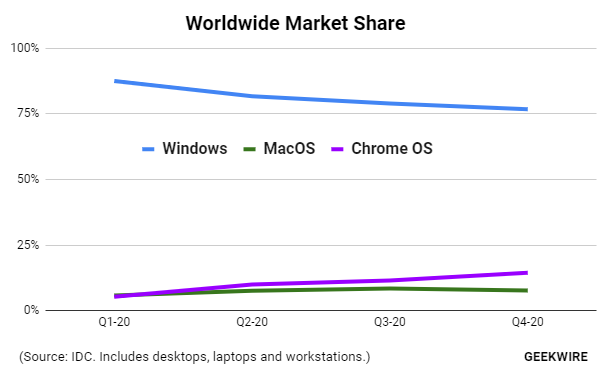Chrome OS saw major market share gains in 2020, and they came at the cost of Windows market share.
What you need to know
- Windows reportedly lost almost 5% market share in 2020.
- Chrome OS went up by over 4% in the same span.
- Windows held a market share of 80.5% at the end of 2020 according to IDC.
New figures indicate that Windows lost almost 5% market share in 2020, with the majority of its share moving to Chrome OS. The figures come from a report by Geekwire based on numbers from IDC. The figures indicate a trend of consumers moving towards Chrome OS. 2020 is also the first time that Chrome OS devices outsold Macs (via iMore).
Before diving deeper into the figures, it's important to note that there is room for error in these figures. IDC's methodology for tracking OS market share helps track trends, but it's impossible to have exact figures for market share at any given time.
Even with room for error, the figures illustrate that Chrome OS devices did well in 2020 and that Windows market share dipped.
Windows market share dropped from 85.4% in 2019 to 80.5% in 2020. Chrome OS market share went up from 6.4% to 10.8% in that same span. Windows still has a sizeable lead over Chrome OS and macOS, even if the latter two are combined, but a drop of almost 5% in a year is notable.
Geekwire breaks down the figures on a quarterly basis as well. Note that these figures are not cumulative, instead indicating figures of each respective quarter:
In Q1 2020, Apple and Google were neck-and-neck: Windows grabbed 87.5% market share, macOS took 5.8%, and Chrome OS captured 5.3%. But in Q2 2020, Windows fell to 81.7%, macOS grew to 7.6%, and Chrome OS jumped to 10.0%.
Q3 2020 and Q4 2020 confirmed the trend: Windows dropped further to 78.9% for Q3 and then 76.7% for Q4; macOS grew to 8.4% for Q3 and then fell back to 7.7% for Q4, while Chrome OS had 11.5% for Q3 and then 14.4% share for Q4. The Q4 results are particularly notable as the fourth quarter tends to be the biggest for PC shipments. While macOS widened its lead over Chrome OS in Q4 2019, Chrome OS came roaring back in Q4 2020.
2020 was a unique year in terms of personal computing. With millions of people working and studying from home due to a global pandemic, people's computing needs rapidly shifted. It's likely that this shift contributed to the growth of Chrome OS over 2020.
As people continue to work and study from home, we'll have to see if these trends continue.
Microsoft is working on Windows 10X, which may help it compete with budget-friendly Chromebooks. In his breakdown of Windows 10X, our senior editor Zac Bowden states that "Windows 10X will launch this spring first for commercial markets. Commercial markets include education and enterprise industries looking for sub-$600 PCs for students in the classroom or first line workers."
With more affordable devices on the way that are geared at first line workers and education, Microsoft may be able to buck current trends.







0 comments:
Post a Comment